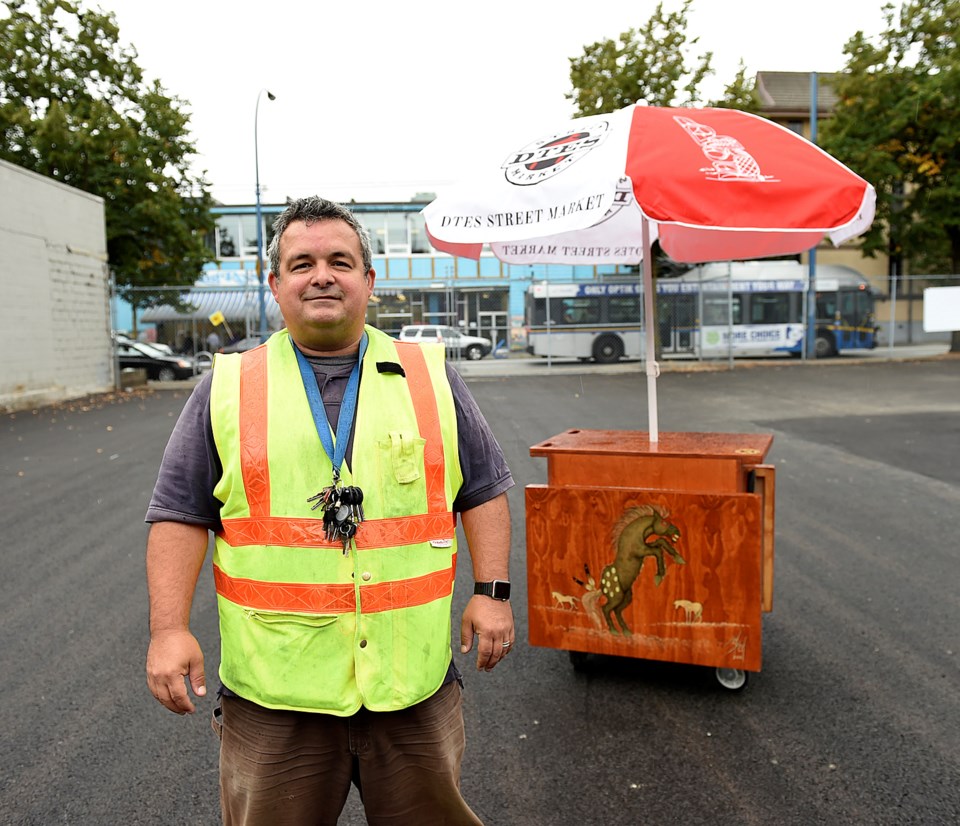Roland Clarke, 46, is the coordinator of the Downtown Eastside street market. He is overseeing the transition of the market from Pigeon Park to a site at 501 Powell St., near Oppenheimer Park. The market will continue to run at both locations until the fall, when Powell Street becomes the permanent venue. The Courier caught up with Clarke to ask him about the market, its vendors and why bikes can’t be sold.
The first day of the new market at the Powell Street site was Aug. 1. How did that go?
It went well. We had over 50 vendors at the height of the day. It was difficult to attract a lot of customers. The Powell Street Festival was going on and we had a couple of customers coming over. It was definitely not the crowds we get at Pigeon Park. It’s going to take time to grow that location. But we had a nice opening.
What’s wrong with the Pigeon Park location?
There are aspects of Pigeon Park that are great. It’s in a tourist traffic area between Gastown and Chinatown. We love that. So you get lots of traffic from the cruise ships, with people wandering through. The bad part of the location is that it’s next to a public street and you have to block off streets when it operates. And to control who vends there is very difficult because some people arrive there before our volunteers set up.
How will the set-up be different at the Powell Street location?
We’ll have a fenced-in lot and nobody will be allowed in until the volunteers set up the area. We’ll be able to control very closely who vends there and the things that are vended. Over the years, there’s been criticism about our market possibly being a magnet for stolen goods. And as much as the volunteers would try and control it, we’re sensitive to that. There were criminals who would come in and capitalize on the fact that there was a big crowd and a lot of customers at Pigeon Park and they would sell things out of bags and so forth. They’re very hard to chase out and control.
Who are the vendors?
Many vendors are homeless, about 30 per cent are women, and I would say the majority live in [single-room-occupancy] hotels, or social housing. And if you’re living in a private SRO hotel these days, rents are getting up to $500 and $600 a month, and welfare only pays $375. So these people are trying to find that supplemental income to not be evicted.
Where do vendors get their goods?
Most of it you would find at a typical garage sale, like used stuff that piles up in people’s garages or basements. In this case, they would pile up in the SROs. People might find stuff in trash bins around the city. Many people in the Downtown Eastside like to go binning. So if they find an old pair of boots, or a toaster oven, they hang on to them, clean them up and sell them at the market. And that’s about 80 per cent of the goods.
How much can a vendor make?
We had a study done by a UBC student last summer and he found that, on average, they make about 75 bucks a day. Some make more than that, and some make 10 or 20 dollars.
How do you know when someone is selling stolen goods and someone is not?
What we find is that most of the people selling stolen goods come in with a backpack, pretend the goods aren’t stolen and they want to sell it quickly. Those are the people we just chase away. And they’re never going to be part of our community, they’re never going to contribute to the market.
I understand vendors are not allowed to sell bikes. Why not?
We decided that bikes were a big magnet. It’s very easy to quickly unload a bike that may or may not be stolen. So we just banned bikes from our market, altogether. We don’t want to have to chase around people and look up serial numbers or accuse anybody. So we just said no bikes because it was such a hassle.
Do the vendors need to be certified?
In order to sell at any market location, you have to have a membership ID which includes your first name and a picture of your face. They have to prove they’re a resident of the Downtown Eastside because we want the social benefits for residents. If any of our volunteers recognize a person as a troublemaker, or ever they’ve ever sold stolen goods, then we deny them a membership.
You’re originally from Hamilton, Ont. and you came out here in 2010. Your bio says you have a PhD in physics from Stanford University and you also founded a bio-diesel co-op in Palo Alto, Calif. How did you end up in your current gig with the market?
About four years ago, through a combination of depression and other things, I became homeless and I was in a homeless shelter. In the shelter, I met the other coordinator of the street market and together we found the street market goods to be cheap. But the market was being mismanaged. That’s why we decided to take it over because it was doing such a positive thing for people like us who needed to buy inexpensive stuff. I’ve had a lot of different experiences in my life. I guess I’ve had the misfortune of falling on hard times in Vancouver but I’m making the best of it by volunteering and coordinating this market.
This interview has been edited and condensed.



